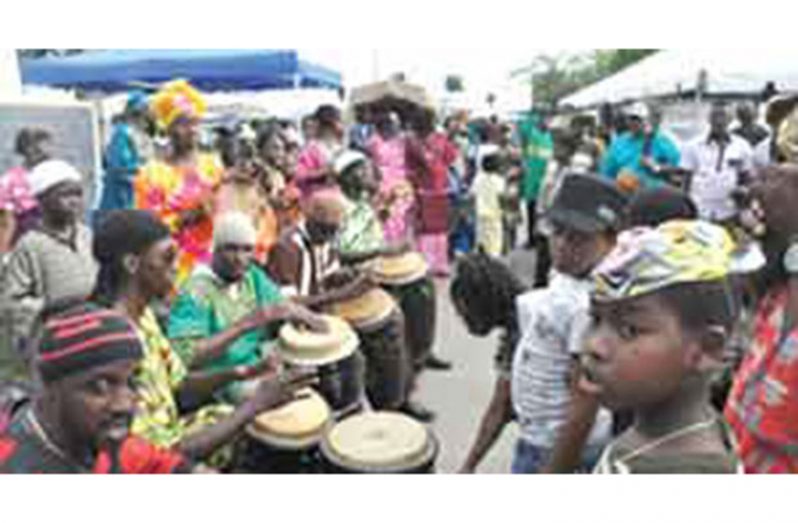SOIREE is the celebration of Emancipation from slavery in 1838. It takes place on the eve of Emancipation Day and the celebration ends on the break of the new day. This cultural festivity has its roots in the 1800s and is indigenous to villages along the coast and banks of the main rivers that Africans bought when they were liberated from slavery.
Villages that have embraced this tradition down to this day are Hopetown, Ithaca, Belladrum on the West Coast of Berbice; Buxton and Victoria on the East Coast of Demerara and Bagotville on the West Bank of Demerara. Soiree is a mixture of libation ceremonies to evoke the spirits of the African ancestors, African drumming, chanting and shanto dancing.

The village of Hopetown was bought by ex-slaves in the 1840s and the tradition of Soiree dates back since then. Drumming, marching and dancing would start around 18:00hrs on the eve of Emancipation in an area of the village called ‘Twenty Two’, and the large crowd would disperse into groups to keep their separate libation ceremonies, while the main road is flooded with hundreds of boom boxes which create a party atmosphere for the young people.
Similar celebrations and ceremonies are held at Bagotville on the WCD. Bagotville’s first soiree was held in 1952 by Mr. Isaac Croker and it lasted for nine days or as they would traditionally call it, ‘nine night’. At 18:00 hrs, on July 31, there is a thanksgiving church service at the village’s traditional church. At 22:00 hrs, the villagers then head to the village koker for the libation ceremony. They dance and mimic the sounds of the drums and other musical instruments, awaking neighbouring villages as they make their way to the koker. Upon arriving there, they sing to African rhythms as they “invite the ancestors to join the celebrations”.
When it is certain that the ancestors are “within their midst”, the celebrants move over to the community centre for a grand enjoyment. At this time, the centre is filled with spectators, dancers, drummers and singers, as well as children. At about 06:00 hrs, the libation ends, but not the Emancipation celebrations! This continues throughout the day. A packed programme, prepared weeks in advance, is started at about noon. The villagers gather at the centre once again to witness the traditional concert. This includes African dances and songs; skits; speeches; and most importantly, the storytelling.
While the older folks are often the one to celebrate soirees, there are youths who have embraced the culture and encourage their friends to do the same. “It must not be a tradition that should die, it must be passed on. Our parents’ parents did it, our parents did it and we must do it as well,” Fonsie James, a 24-year-old of Hopetown, B erbice. James said that the youths have a responsibility to carry on the culture and it is indigenous to their villages and he will be advocating for same. He is unhappy with the way youths are transforming the culture into a mere party and believes that it should stick to what it is, a celebration of liberation from slavery and not a night of partying as is the case of every weekend. For that night alone, Fonsie is calling for youths to shun the boom boxes and embrace the drums, shun the millennium fashion garbs and embrace their African dashikis and head wraps, shun the barbeques and beers and embrace the traditional African drinks and food. “Apart from the small groups that try to keep the tradition, mostly there is men sporting, women wining to the boom box music, the young people drinking and smoking, barbeque and all these fancy nowadays food selling and it is really sad,” James said. He admonished that it is not only about being present for the soiree but keeping it as a real soiree celebration.

Similar sentiments were echoed by Llewelyn Cyrus of Bagotville Village. Cyrus said that in the emancipation celebrations held at the community centre on Emancipation day, the audience mostly consists of the older and middle age folks. “Where are the youths?” Cyrus asked. “We need to come out and support the celebrations more, we need to embrace the culture as did our ancestors and let the celebrations remain.”
Joy James has her roots in Hopetown Berbice, alhough she was born in Linden. Her parents are both Berbicians but her father had travelled to Linden in search of employment and her mother soon followed. Despite being born and bred in Linden, Joy believes she is a true Berbician and journeys back to Hopetown every year to celebrate with her relatives who still live there. She also sometimes take her friends so that they too can get a feel of her village culture and when her teenage son was living in Guyana, he too was sure to attend Soiree so that the culture can be passed on from one generation to the other.



.jpg)











